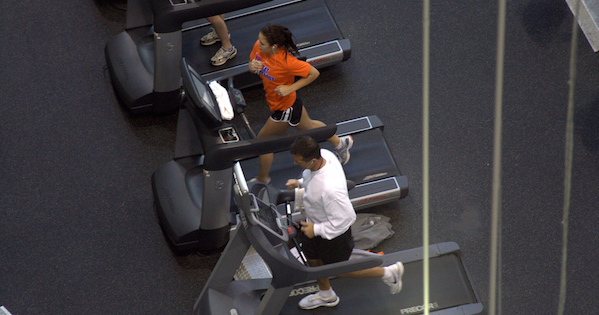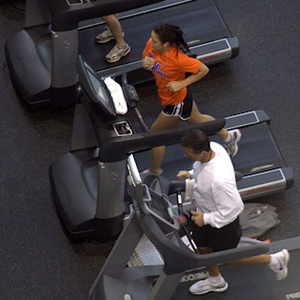
Working out is all about discipline, so getting in a workout when you feel sick can be a tough decision. Should you skip it and rest or just grit your teeth and push on through? Here are some tips for knowing when you can exercise while sick and when you really need to kick back and let your body rest.
WHERE ARE YOUR SYMPTOMS LOCATED?
A handy guideline for exercising while sick from the Mayo Clinic is based on the location of your symptoms: If they are mostly above the neck (runny nose or sore throat, for example), it's probably okay to engage in moderate exercise. Remember to be considerate of people around you, however, because viruses are contagious. Cover your mouth when you cough, don't share water bottles, and wipe down equipment with an alcohol-based antiseptic when you're through.
Below-the-neck symptoms such as chills, upset stomach or all-over body aches, however, mean you - and everyone around you - will be safer if you stay home and rest instead. Trying to ignore a feverish illness and pushing your body to its limits will not likely help your condition improve and in fact you could stay sick longer than if you simply rested until you started to feel better.
PROTECT YOUR IMMUNE SYSTEM
Sometimes people ask, “can overtraining make you sick?” Not directly, overtraining can contribute to a lowered immune system that makes it easier for athletes to get sick. Research cited by Rice University points out that overtraining (in this case, training for and running an ultramarathon) led to the development of upper respiratory infections in two out of three athletes. Immunologists have found that elevation of the body's stress hormones results in a temporary drop in resilience. Overtraining, or working at high intensities for 90 minutes or more per session, produces enough stress hormones to cause a steep drop in immune function that can last up to 24 hours.
TAKE CARE OF YOUR BODY WHEN TRAINING
Skipping an occasional workout may be well worth it if it helps you avoid a full-blown cold or flu. If you've been working out at high intensities, consider taking a rest day or reducing the intensity of your next session if you feel like you might be getting sick. Your body will thank you and you'll get back to your full strength workout quicker. And remember, it's OK to miss a day if your illness is below the neck.
If you think you've been overtraining, or want to find out how you can avoid the pain of overtraining, please download our free ebook: How to Stay Active When You've Overtrained.







